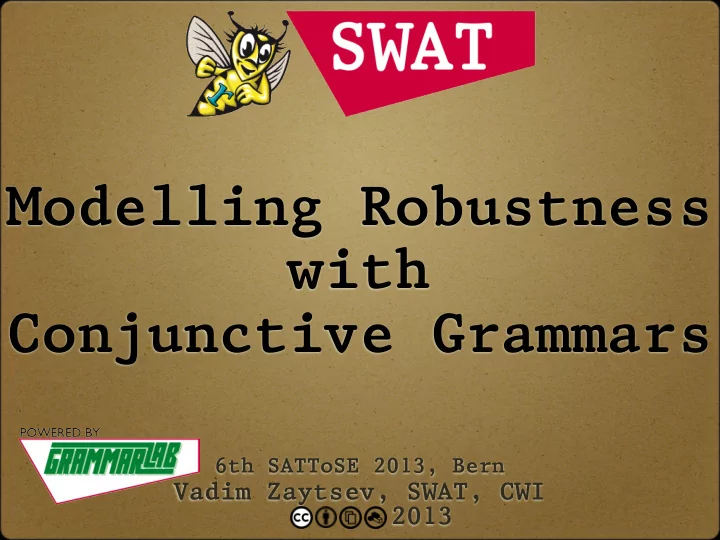

Modelling Robustness with Conjunctive Grammars 6th SATToSE 2013, Bern Vadim Zaytsev, SWAT, CWI 2013
Motivation
Motivation • No ideal model for robust parsers • Island parsers are often idiosyncratic • Have fun with conjunctive grammars • Grammars in da cloud • … • PROFIT?
What’s a grammar? • Language definition • characteristic function of the language • iterator for language elements • “grammatical correctness” • Commitment to grammatical structure • <N,T,P,s,…> P. Klint, R. Lämmel, C. Verhoef. Toward an Engineering Discipline for Grammarware . ToSEM, 2005.
What about semantics? • Grammars define syntax • Syntax is just the beginning of semantics • …or is it? • Colorless green ideas sleep furiously. Noam Chomsky !
Syntactic Structures (1957) Despite the undeniable interest and importance of semantic and statistical studies of language, they appear to have no direct relevance to the problem of determining or characterizing the set of grammatical utterances. I think that we are forced to conclude that grammar is autonomous and independent of meaning. Noam Chomsky !
Grammars define structure & can assume different semantics
What’s a conjunctive grammar? • Classic grammars define sets of words • Set operations: • disjunction / choice / addition • conjunction / intersection • negation • Purely theoretical extension • Scarce Some practical uses A. Okhotin. Conjunctive Grammars . JALC, 2001.
What’s robustness? Fuzzy Island Skeleton Error parsing grammars grammars repair Precise Lexical parsing analysis Figure 10. A spectrum of approaches for source code analysis. • Tolerance towards language dialects • Agile grammar hacking engineering • Negotiated transformations • Information recovery heuristics S. Klusener, R. Lämmel, Deriving Tolerant Grammars from a Base-line Grammar , ICSM 2003
Island grammars
Island grammars • Detailed production rules for interesting constructs • Liberal production rules for the rest • ~[\.]+ [\.] ! Statement • ~[\ \t\n]+ ! Water {avoid} • Minimal set of assumptions about the overall structure • (e.g., “a program is a list of statements”) A. van Deursen, T. Kuipers, Building Documentation Generators , ICSM 1999. L. Moonen, * using Island Grammars , WCRE 2001, IWPC 2002.
Conjunctive clauses • Statement is a chunk between dots/semicolons/… • Statement is also something else • keyword, expression, block • So, we define a statement • as an “island” and as a statement
Assumed semantics 1 • Take a conjunctive robust grammar • Parse classically as a conjunctive grammar • recursive descent or generalised LL • Run over a sufficiently big reference codebase • " validation of the robust grammar
Assumed semantics 2 • Take a conjunctive robust grammar • Parse only with detailed clauses • If failed, backtrack to tolerant clauses • locally • " disciplined error recovery
Assumed semantics 3 • Take a conjunctive robust grammar • Parse only with tolerant clauses • obtain the global structure • Parse the islands with subgrammars • if possible • " grammarware as a service
Parsing in the cloud
Parsing in the cloud compilation-unit: using-directives? global-attributes? namespace-member-declarations? using-directives: using-directive using-directives using-directive using-directive: using-alias-directive using-namespace-directive using-alias-directive: "using" id "=" namespace-or-type-name ";" ...
Parsing in the cloud vertical(using-directives); deyaccify(using-directives); inline(using-directives); inline(using-alias-directive); inline(using-namespace-directive); massage(using-directive+?, using-directive*); factor( (("using" identifier "=" namespace-or-type- name ";") | ("using" namespace-name ";")), "using" ((identifier "=" namespace-or-type- name) | (namespace-name)) ";"); ...
Parsing in the cloud compilation-unit: ("using" using-directive-insides ";")* ("[" "assembly" ":" ga-section-insides "]")* namespace-member-declaration* namespace-member-main: "namespace" qualified-identifier class-base? "{" namespace-body-insides "}" ";"? "class" identifier class-base? "{" class-member-declarations? "}" ";"? "struct" identifier struct-interfaces? "{" struct-member-declarations? "}" ";"? "interface" identifier interface-base? "{" interface-member-declarations? "}" ";"? "enum" identifier enum-base? "{" enum-body-insides "}" ";"? "delegate" type id "(" formal-parameter-list? ")" ";" ...
layout L = [\ \t\r\n]* !>> [\ \t\r\n] ; Parsing in the cloud syntax CompilationUnit = ("using" NotSemicolon ";")* ("[" "assembly" ":" NotRightSquareBracket "]")* NamespaceMemberDeclaration* ; syntax NotRightSquareBracket = NRSBChunk+ () >> [\]]; lexical NRSBChunk = ![\]\ \t\r\n]+ >> [\]\ \t\r\n]; ...
Parsing in the cloud using-directive-insides: ... ga-section-insides: ... attribute-section-insides: ...
Related work • Quasi-synchronous grammars • natural language translation framework • Parallel parsing • usually non-distributed, but concurrent • Ambiguity elimination • ambiguity is bad, okay? • Permissive grammars • explicit error recovery rules
Related work • Quasi-synchronous grammars • D. A. Smith, J. Eisner. Quasi-Synchronous Grammars: Alignment by Soft Projection of Syntactic Dependencies. StatMT 2006. • Parallel parsing • H. Alblas, R. op den Akker, P. O. Luttighuis, K. Sikkel. A Bibliography on Parallel Parsing . SIGPLAN Notices 1994. • Ambiguity elimination • H. J. S. Basten, Tracking Down the Origins of Ambiguity in Context-free Grammars , ICTAC 2010. • Permissive grammars • L. C. L. Kats, M. de Jonge, E. Nilsson-Nyman, E. Visser. Providing Rapid Feedback in Generated Modular Language Environments. Adding Error Recovery to SGLR Parsing. OOPSLA 2009.
Current/future work • Robustness techniques & tolerance spectrum • Semi-parsing with Boolean grammars • Validation/testing of skeleton grammars
Stay tuned! vadim@grammarware.net
Recommend
More recommend